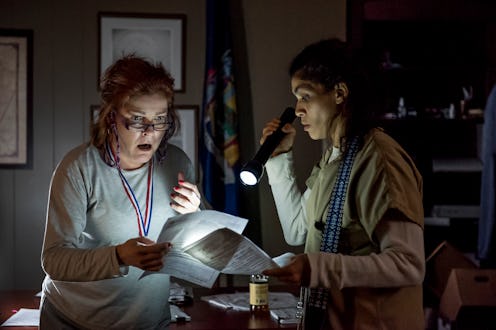
SPOILERS for Season 5, Episode 9 ahead. Red's Soviet Union flashback on Orange is the New Black not only showed Galina as a hip young woman of the '70s with dreams that stretched across the Pacific, but she and her friends were engaged in a black market enterprise no longer necessary today. Her organized crime days started early, but with a very different substance. When was it illegal to wear jeans in Russia, and why? Orange is the New Black drew from reality for this particular flashback.
Though it seems like just an everyday wardrobe item in 2017, American-made blue jeans symbolized freedom, capitalism, and the West in Soviet Russia, according to Russia Beyond The Headlines. They were never directly banned, but it was near impossible to get anything Western made past the Iron Curtain. Blue Jeans were introduced to the youth in the country in the '50s and imported jeans were eventually banned. Soviet-made jeans were allowed, but never met the same quality standard. In 1961, two traffickers that were put to death had "trafficking in jeans" among their list of crimes, according to RBTH.
According to Vice, a Life magazine article in 1972 observed that Americans vacationing in Russia and Europe at this time could easily finance their trip by backing a couple of extra pairs of jeans to sell on the black market. An average Soviet worker's monthly salary could be traded for a single pair of Levis or Wranglers. Before long, obtaining denim articles of clothing was even called "jean crimes" by Soviet officials. A few years later, Levi-Strauss was nearing a deal to open a factory in Moscow — but then Jimmy Carter boycotted the 1980 Olympics, and talks ended. Only when the Iron Curtain fell in the '90s was American denim made available.
In the Orange is the New Black scene, the young jean smugglers are also dying, acid washing, and fading the denim to achieve different looks that Soviet-made jeans could never achieve. It's quite the operation that Kostya, Pavel, Nadezhda, and Galina have set up. The fact that Russian youth really did deal in jeans in the '70s and beyond makes it even more interesting.